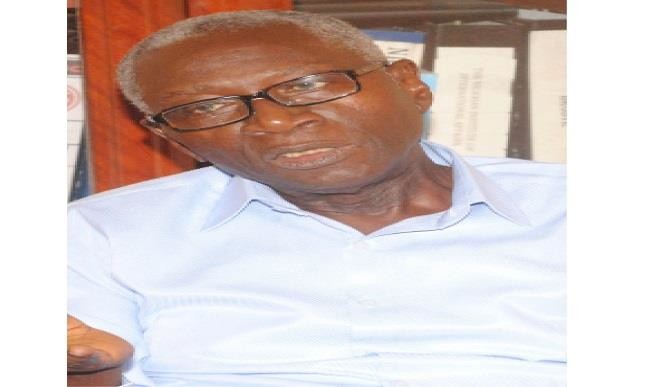Late budget, faulty fiscal planning dim hopes for 2017 – Boyo
From Temitayo Odunlami, Sunday Michael Ogwu & Abdulateef Aliyu, Lagos What is your assessment of the Nigerian economy in 2016 and what are your projections for 2017? It behoves on every responsible person, private or public, to evaluate the country’s economy in the New Year against the outgoing. A responsible government itself needs to do […]


From Temitayo Odunlami, Sunday Michael Ogwu & Abdulateef Aliyu, Lagos
What is your assessment of the Nigerian economy in 2016 and what are your projections for 2017?
It behoves on every responsible person, private or public, to evaluate the country’s economy in the New Year against the outgoing. A responsible government itself needs to do a thorough, well-rehearsed, well thought-out fiscal planning. Unfortunately, successive governments in Nigeria have used the same instrument of fiscal planning to slap our faces since the civilians came into power. Can you remember any year that the budget has been passed earlier than April? And we need to look at what the impact of our budgets has been, especially when, every year, the recurrent expenditure takes up to 70 per cent when it shouldn’t be gulping more than 30 per cent.
In Nigeria, our lack of attention to the details of the budget exposes us and our families to dangers of economic rape. To start with, if you are spending the bulk of what you earn rather than saving and using it for infrastructure, you can never get very far. Unfortunately, this has been the common factor in all our budgets.
Since 1999, there has been no time that the government has proposed a surplus budget. Of course, a surplus budget means you are spending less than you earn. But what we have always had is a deficit budget, which means that we have had to be borrowing every year. We have been borrowing cumulatively without proper planning. Next year has not been planned to be different.
It is a contradiction that we have been borrowing because we have always earned more than our budgetary benchmarks. With the exception of the last two or three years, there has been no year we had not earned more revenue than we budgeted for. But it wasn’t until about five or six years ago that we thought of initiating a Sinking Fund where they said they would be depositing about a N100 billion every year.
But the question is: Have we always spent more than we actually earn? What I am saying is that the deficit component annually that we incur, we will already project to borrow to cover it. Now, simultaneously that we are borrowing to cover the deficit, we have excess funds, which is why we call it an Excess Account. So the cycle is that you earn more money, build up an Excess Crude Account and then you borrow at a ridiculously outrageous high rate to fund the deficit and the debt burden keeps increasing.
We deliberately project very conservative benchmarks for our income sources. Then we predicate a deficit ab initio based on a false premise because we deliberately want to ensure that we borrow. What a sensible government will do when there is excess revenue is tell itself there is no need to borrow. But in our case, we complete the borrowing circle and consume the excess.
Someone gave an excuse that the state governors, under the Governor’s Forum, came together to maintain that the excess income must be shared. When they spend in such a manner and then borrow to cover the deficit, who are they deceiving?
You want to think that it is not worth discussing the budget in Nigeria to project the year because ab initio, the structure is defective. How long will it take us to realise that budgets for the incoming year are not laid before the parliament in the last month of the year? You submit your budget late, you pass it late, capital expenditure is badly expended, and you deliberately understate revenue expectations only so you can borrow some more and in the process crowd out the real sector and come back later and say we must diversify our economy. How can you diversify when development is already affected through underfunding of capital expenditure, and then government is the chief borrower in the country?
It also seems we don’t have regards for the potency or importance of monetary indices. We talk brazenly about how much we will spend without realising that the total quantum of money the government spends from the fiscal plan is always a very modest amount compared to what is required to drive the economy. Meanwhile you ignore the monetary indices that will open the door for more investment to be possible.
For example, the N7 trillion budget for 2017, which is described as the largest we have ever had, is just about $21 billion. Is it such an amount that will change our lives, especially when we are told that power alone requires immediately, at least, $100 billion to address? We are not talking railways, roads or even recurrent expenditure. So why must you place your faith helplessly on a fiscal plan of N7 trillion and say oh things will start getting better once they approve the budget, especially on spending that will be taken for granted because 70 per cent will be spent anyhow on consumption and the 30 per cent for capital will not be available until April? How do you achieve anything meaningful in eight months?
In all this, we need to recognise that it is not the budget that will save us. There is also the need for a fundamental restructuring of the monetary policy framework to ensure inflation comes to the best practice level. If there is no excess liquidity to mop up, inflation will go don and cost of funds will also go down.
